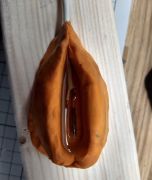|
prom candy posted:Also, this is getting more into "how do cars go" territory but why does downshifting let you accelerate faster even though I just as often hear people talking about downshifting in order to engine brake? In addition to monsterzero's answer, engines don't make the same power at all speeds, even at full throttle. Most modern econoboxes make the most power around 5k rpm. When you downshift, the engine speeds up and generally lands closer to that peak power rpm, so you've got more power available even before the mechanical advantage thing. The same is basically true for engine braking, the force required to pump inert air increases with speed; it's called pumping loss and it's most of what makes engine braking work, and the faster your engine is spinning the more work it takes, which manifests as a braking force through the drivetrain to the wheels. It still works at low rpm, but downshifting increases its effectiveness, especially on modern engines which typically flow pretty well at low speed. The only danger in downshifting is over-revving, but most modern cars will safely do highway speeds even in third gear (my old MSP topped out 2nd gear at 60 mph) As long as you keep it below the redline you're fine (that's what it's for).
|
|
|
|

|
| # ? May 14, 2024 04:48 |
|
kid sinister posted:For a concentric slave cylinder? Explain how.  See how the bottom of the trans is about the same level as the crossmember? If you take off the mount/spacer between the trans and the crossmember, you can slide the transmission back onto the crossmember enough to get at the slave cylinder. kid sinister posted:But yeah, I do need to drop the whole thing. Something is leaking and the whole thing could use a good cleaning. If the front is leaking, you might could still fix it by just scooting the trans back, but you'll probably want to be able to get a better look at it than that method would afford. If the rear is leaking, you can just remove the tailshaft housing (without removing our scooting back the transmission) and squeeze on a thin layer of sealant.  If you're going to remove the trans all the way, rather than a jack or cradle, you can use a board to rest the transmission on (and strap it down of you want) and use pieces of wood to shim it up and down as needed. joat mon fucked around with this message at 05:45 on May 21, 2017 |
|
|
|
MoonCricket posted:I've been working on a project 280z and I'm at the point where I need to teach myself how to weld. I have a lincoln weld pak 100 that I really dont know where I got it and have used it to successfully weld a few things in the past but they weren't pretty. What I know I am going to need weld is patching a lot of spot welds where I am replacing the spare tire well, a few spots in the floor pans, and I know I want to reinforce the chassis but I haven't got to that point yet. I have practiced on some sheet metal that came out of the spare tire well donor car and at a low setting I am either not making a successful weld or blowing through it. 100A is useful for thin sheet metal, though it's nice to be able to go higher for sure. I assume the "mig conversion" you mention is a shield gas add-on to a machine build for flux core only? If you end up buying a better welder you'd still have use for a gas bottle and regulator, some hose and at least some of the fittings such a conversion would include. The solenoid gas valve would be integrated in any serious MIG welder so that would be a bit of a waste in such a case.
|
|
|
|
joat mon posted:
Make that 4. Mine was leaking out the shifter hole up top. I just did a shifter bushing kit today to fix that one. Anyway, what caused me to start this work is that my clutch pedal is slow to come back up and there was a red drip on the very back bottom of the transmission. Last week I put on a new oil pan and gasket, then the timing cover gasket, front crankshaft seal, PS pump and hoses this week to fix those leaks. I ran the engine long enough to get the thermostat to open up so I could refill the coolant, then ran the garden hose down the insides once it was cool to get rid of the antifreeze I spilled. There were some darker drips hanging off the bottom of the block plate up front that I noticed after this, so I don't know if those block plate drips were oil, clutch fluid, or just grimy water. They did feel a little oily. While I was doing all this work, I did scrape a shitload of grime off every surface I could. My truck probably lost 50 pounds. So red is tranny fluid. Mine had a confirmed leak out the top, which I fixed. There was oily grime down the tranny sides and the red drip at the bottom back. I don't know if it has more than one leak. With the age of this truck and my luck so far, I'd say it does have more than one. Then my crankshaft might still leak at the back. Does that sound right? My truck leaks everywhere
|
|
|
|
prom candy posted:I'm back with more manual transmission questions (is this the right thread for this? seems like most people need help fixing their cars, not driving them) I did my first long drive in a MT car this weekend and want to clarify a few things about driving stick on the highway. My wife (the owner of said manual car) has her own way of doing things but it's often at odds with what I've seen online, so I'd like to understand not just the what/how but also the why. For reference, the car is just a 2008 civic 5MT. See that red area on the tach? You can safely get up to the edge of that area regularly (probably a little into it, but you'll hit fuel cut if you do) - I wouldn't sit at 6000 RPM all day, but you're not going to hurt anything with a trip up to redline here and there. It's worse for the engine NOT to get wound up now and then - you wind up with a ton of carbon buildup in the engine. Every car I've owned has seen 6000+ at least once a day, and they've all made it well past 200k miles. I've managed to kill an engine once by overrevving it, but that was when I tried to downshift from 5th to 4th at about 80 mph, and wound up hitting 2nd gear instead (the tach only went to 8000, but the needle went way past that  ). ).As for why downshifting helps you accelerate - have you ridden a bicycle with multiple gears? Yes? Okay. Put your bicycle in the highest gear. Try to pedal from a stop. It's a lot harder, right? Try going uphill. Ain't happening, is it? Knock it down a few gears, and suddenly you're moving. Your legs are moving a bit faster than they would in the highest gear, but you're cruising right on up that hill now. A car's engine and transmission work much the same way. If you had just one gear to choose from, you'd have to figure out a way to make it possible for the car to get going on its own, while not overexerting itself at cruising speeds. You'd be roasting your clutch frequently if you tried to get your car moving in 5th gear every time; it'd be hard on the engine too; it doesn't make much power at low RPMs (especially a small engine like one in a Civic). Like on a bike, you want to use the tallest gear that doesn't put too much strain on the engine. You'll know when it's running at too low of an RPM - it'll sound pretty unhappy. Every car is different, but you'll get a feel for it pretty quickly. If you haven't ever ridden a bike with multiple gears, uh, I guess hop on a treadmill and crank the hill/ascent angle up as high as it goes. That's like 5th gear at low speeds to a car.
|
|
|
|
prom candy posted:I'm back with more manual transmission questions (is this the right thread for this? seems like most people need help fixing their cars, not driving them) I did my first long drive in a MT car this weekend and want to clarify a few things about driving stick on the highway. My wife (the owner of said manual car) has her own way of doing things but it's often at odds with what I've seen online, so I'd like to understand not just the what/how but also the why. For reference, the car is just a 2008 civic 5MT. Huge amount of variables, but rule of thumb is to always be in a gear that allows you to react quickly when in situations that require it. Then when it's chill, highest gear possible for best MPG. When it comes to passing it's down to the car / situation. If I pass on a highway I usually don't have to shift down because the car has pull and it doesn't lug the engine. If I pass on a country road I usually downshift to get past as quickly as possible. Lugging the engine is worse than revving it. People such a weird aversion to revving engines. Why you shouldn't do what you wife is doing: https://www.youtube.com/watch?v=soJea7xEt-8
|
|
|
|
2008 Saturn vue with the 4 cylinder 2.4. It has 115k miles on it and always got the normal oil changes, I just changed the spark plugs but it probably needs the transmission fluid changed. Anyways, it has a few random squeaks now and I'm not sure what it could be. Most recently, after a 3 hour drive, when we turned into the gas station it just sounded like it was squeaking pretty bad when we turned the wheel. I don't think anything related to shocks but more the steering system? It was coming from the front of the car but that's all I know. Also, for a long time, when the wheel gets turned slightly to the left or right, there's an oscillating sound I'm thinking might have to do with the brakes. It's kind of like if you had a rim on a bike that's slightly out of true and you put it on a truing stand and once per revolution it hits the metal, that's the sound it makes. I'm probably going to have to take it to a mechanic to really find out, but any shots in the dark as to what could be wrong? Also, for the first problem-could the chassis or something else potentially just need lubed up? I remember when I brought other cars in for service they would say lube the chassis as part of the tune-up, and I've just been bringing it to jiffy lube for oil changes so I doubt they have been doing that. Just wondering if I can also request some basic tune up that won't charge an arm and a leg to fix everything. Also, I was quoted $225 for the transmission fluid to be changed-Rip off or average cost for this?
|
|
|
|
Check that your power steering fluid level is okay. If it's a bit low - things can act weird. The sound that has to do with the brakes - it might just be the brake dust shields touching the edges of the rotors. Have a brake inspection done - most shops do brake inspections for free. Ask for the pad measurements - how many 32nds are left. They start new around 10 or 11/32. Replace when they get down to 2 or 3/32" There's really nothing to lube on the chassis on a Saturn Vue - like most modern cars. The ball joints on 95% of cars don't have grease fittings anymore. Tie rods haven't had them for years in most cases either. There's no u-joints or idler arms or pittman arms or any of that on a VUE either. I'll let someone else weigh in on the transmission flush - but I'm wary of the flush process. I've heard things. All I'd do if it were my own car is a drain-and-fill. Tune up? On a vue - the tune up is simply the spark plugs, air filter and fuel filter (if it's serviceable - some cars have it only in the tank) And if your're feeling really fancy - the PCV valve.
|
|
|
|
kid sinister, if you do decide you need to drop your transmission, I suggest renting a proper transmission jack. You can buy a cheap one at harbor freight etc. but they're pretty junky, whereas a solid good one to handle a big truck transmission costs several hundred bucks. Monkeying around with straps and boards etc. can definitely work, but man... having the right tool for the job is almost always a better way to go. Call around to equipment rental places in your area. I was able to rent a transmission jack for $40, which was cheaper than buying a junk one but it gave me much better control (tilt, lift, roll, yaw, and so on) and was big and solid enough to never be in danger of tipping over. Whatever you do, don't be under the thing when it tips. Also even after you drain it and open the pan and drain it more, it's still got buckets of transmission fluid in it which will come blooshing out the tailstock as soon as you tip the tail downward, so be ready for that.
|
|
|
|
After removing the oil pan, radiator and power steering pump these past few weeks, one more fluid won't phase me.
|
|
|
|
I've now just about got my car (a 1980 Saab 99) ready for respraying, and want to buy the paint. I'm doing a full respray in cellulose paint and I want to clear laquer it over the top as on my other car I got a few stone chips after I painted it and they made me quite sad. However - I have never used laquer and am unsure how much I will need to buy? I've done a full respray on the same model car before and it took me about 6L of top coat (It was 5L for the outside then about another 1L for the inside of the boot lid, bonnet and doors), but I am guessing that I will need less laquer? For sizing - this is it about 3 weeks ago. I will be doing the bonnet and doors too. 
|
|
|
|
Thanks for the info guys. I'm going to have to experiment with the car a bit and see how it reacts (when my wife's not in the passenger seat). I won't be so afraid of getting it up above 4000rpm here and there.
|
|
|
|
I asked a while back but is there a way to ID a turbocharger based on part casting numbers? My club has a turbo that has Holset cast into the compressor housing, but Holset's site says to look at the data plate; our turbo doesn't have one, just various numbers cast into the pieces. I did send them a message with all the numbers, but that was like Wednesday and I haven't even gotten the promised confirmation email, let alone a response. E: All I know about it is it was "off some dump truck". Fender Anarchist fucked around with this message at 21:55 on May 21, 2017 |
|
|
|
MrOnBicycle posted:Huge amount of variables, but rule of thumb is to always be in a gear that allows you to react quickly when in situations that require it. Then when it's chill, highest gear possible for best MPG. When it comes to passing it's down to the car / situation. If I pass on a highway I usually don't have to shift down because the car has pull and it doesn't lug the engine. If I pass on a country road I usually downshift to get past as quickly as possible. Lugging the engine is worse than revving it. People such a weird aversion to revving engines. To add to this - you're driving a Honda four cylinder. Those engines are built to rev. I hit WOT probably daily in my CR-V, and the automatic in that will hold off on an upshift until just before fuel cut.
|
|
|
|
I'm working on the battery pack for my electric truck: My truck is jacked up on wood blocks, I have the battery pack on a Harbor Freight 1000-lbs motorcycle lift. With the pack empty, I can just barely slide the whole thing under the truck with my own strength. With the battery pack full, it weights 800 pounds, and our driveway is super cracked and crooked, hence I can't budge the thing at all. I came up with an idea... maybe I can buy something like this C-channel steel bar from Home Depot, and lay them along the ground like "railroad rails": http://www.homedepot.com/p/Everbilt-2-in-x-36-in-Plain-Steel-C-Channel-Bar-with-1-8-in-Thick-801217/204225748 I'm wondering if that would let me slide the pack in and out from the under the truck easily. I just need the wheels to follow a straight line and not get hitched on the land-mined driveway. Those C-channel things seem really expensive though, and short. Anyone know where I would look to get something longer/cheaper, or if there's something else more appropriate to slide an 800-pound coffin around on uneven terrain?
|
|
|
|
Zero VGS posted:I'm working on the battery pack for my electric truck: A sheet of plywood and a bunch of dowels? You could pretend you're building the Pharaoh's tomb.
|
|
|
|
monsterzero posted:A sheet of plywood and a bunch of dowels? You could pretend you're building the Pharaoh's tomb. That would raise everything up by another two inches which would make the top of the battery hit the truck, and I can't really raise the truck any higher since I'm at the limit of my jack. Plus, more than an inch of play to either side and it won't slide under either. Edit: These seem good: https://www.metalsdepot.com/products/hrsteel2.phtml?page=channel 20ft steel and a better price, but they cost $200 to ship, or $15 if I have them cut. Maybe I can find a local place that stocks them this long...
|
|
|
|
I'd probably try using a come-along to just move the rig around as you have it. Probably the most straightforward, and you can use it for other stuff when you're done.
|
|
|
|
Raluek posted:I'd probably try using a come-along to just move the rig around as you have it. Probably the most straightforward, and you can use it for other stuff when you're done. That's... kinda what I was doing so far; to get the pack out in the first place when it was 1000 pounds with old lead batteries in it, I used some racheting tie down straps and parked my Smart Car in front of the truck, tensioning four tie down straps was enough torque to force the pack out with the lift grinding along the pavement. The main thing is if I'm going to keep working on the pack, I need to slide it under the truck each night so my family can park in the driveway.
|
|
|
|
Is that pan sturdy enough that you could jack it off that lift by the ends or sides and lower it onto a dolly?
|
|
|
|
|
Zero VGS posted:That's... kinda what I was doing so far; to get the pack out in the first place when it was 1000 pounds with old lead batteries in it, I used some racheting tie down straps and parked my Smart Car in front of the truck, tensioning four tie down straps was enough torque to force the pack out with the lift grinding along the pavement. You'd have a lot more leverage with a come-along, but if it's that reluctant to move then maybe that wouldn't work too well. Maybe you could bolt some casters onto those ears on the battery case, if they would roll easier than the jack and be cheaper than the rails?
|
|
|
|
0toShifty posted:Check that your power steering fluid level is okay. If it's a bit low - things can act weird. Thanks for the reply! The brake dust shields...you might be right on that and it seems like it should be easy enough to check out. I didn't know about new cars not needing to be lubed up. I just remembered seeing it as part of "101 point inspections" at dealerships and stuff. Still not sure on a transmission flush/drain and fill. I've heard it's best to just drain and fill it consecutive with 2 or 3 oil changes in a row. That's what I did with my Accord when it hit 100k miles, and after 3 transmission drain/fills you're basically sure you've got about 90% new oil in there and that should be more than good enough.
|
|
|
|
Zero VGS posted:I'm working on the battery pack for my electric truck: Is there a metal supermarket near you? They'll probably deliver you some C channel for free.
|
|
|
|
I was recently given a 2002 Ford Taurus with 38,000 miles. All miles were short trips to the store and for the last 5 years it was barely used. I did some basic maint on it when I first got it, listed below. It has a few issues I'm not worried about, such as AC not working and the gas cap light (evap system?) on the dash. I've been driving it daily and can feel what I can best describe as a shudder whenever I turn the AC/heat on at highway speeds. I can especially feel it with my foot on the gas while going up a hill. The shudder will last for about a second and then repeat ~20-30 seconds later. If the shudder exists without the air on, it's either too subtle to feel or it just isn't there. Here is what I've done to the car: -replace spark plugs -replace fuel filter -clean maf sensor -had shop check for misfire (there weren't any) -replace front disc pads/rotors -oil and filter change -new battery -had autozone check to see if it was throwing any codes (none) I'm mainly concerned about the shuddering and don't want it to get worse. Any ideas what might be causing this? Someone told me it may be the torque converter in the transmission but it has such low mileage...
|
|
|
|
My guess would be the AC compressor. Given the AC doesn't work, the shudder would correlate with the system telling the AC to kick on and the compressor saying "nope." Five years of just sitting around probably means you should replace the tires, as well. They may have developed flat spots and the rubber degrades over time.
|
|
|
|
Thanks, I'll look into that. I actually did get fresh tires already, just forgot to list it. edit: would the same symptoms be occurring when I turn on the heat if it's the compressor? hot sauce fucked around with this message at 02:12 on May 23, 2017 |
|
|
|
hot sauce posted:Thanks, I'll look into that. I actually did get fresh tires already, just forgot to list it. If you have defrost on, maybe. Some cars run the AC while some heat modes are active to dry the air.
|
|
|
|
As someone who loves cars, but never really wrenched on one and wants to change that, I figured I might as well start with the simple thing: oil changes. So I have a 2005 Toyota Matrix XR (1ZZ-FE) with over 110k miles, but that's not my question. What brand of oil (and filter) is best, and is high-mileage oil worth it?
|
|
|
|
Honestly, with few exceptions, they're all about the same. Any oil that has the appropriate grade and weight will be fine in your engine, and even the orange can Fram filters will do the job. With that said, I usually buy Pennzoil Platinum synthetic when it goes on sale with a rebate, since it ends up a bit cheaper. Oil filters, I'll buy whatever is cheapest from Bosch, Motorcraft, Wix, K&N, Mobil, or a Fram that isn't an orange can. If you order online (and more than one filter at a time) you can generally find one of any of those brands for less than the shelf price of a Fram orange can. My own experience with high mileage oil is mixed. When MaxLife first came out I ran it in my C10, since it seemed to slow the flow of the many, many leaks (and hellish blow-by). It didn't seem to do much for my leaky Volvo (scored crankshaft meant the front crank seal couldn't do its job), my Ranger (no major leaks anyway), and zero difference on my Jeep. On the Jeep I even committed the "sin" of switching it from a lifetime of dino oil to synthetic at 115k. The only oil leak it developed is a valve cover gasket that seeps, but it was replaced recently. I'm blaming the Po's shop for screwing it up somehow. It also burns a bit, probably past the valve guides, but total loss is only about 1 qt every 1500 miles. IOwnCalculus fucked around with this message at 15:43 on May 23, 2017 |
|
|
|
I like Mobil 1. There's a reason that its usually listed as a separate oil category at some shops. Ya know, like "Basic - $20, Semi-Synthetic - $25, Synthetic - $30 , Mobil 1 Synthetic - $50" I don't know what that reason is, mind you. But I've seen it spoken of highly around here, and $22.88 for 5qt at walmart is a great deal. I like to pretend me buying good products makes up for how I treat my vehicles so yeah basically what IOC said anything is fine.  edit: Make sure you get a good oil drain pan. The first one I got at advance auto was cheap and it didnt seal all the way. Cage fucked around with this message at 16:31 on May 23, 2017 |
|
|
|
wesleywillis posted:Is there a metal supermarket near you? They'll probably deliver you some C channel for free. Thanks, I never knew about Metal Supermarket but they have one nearby with C channel so I'll try that.
|
|
|
|
iospace posted:As someone who loves cars, but never really wrenched on one and wants to change that, I figured I might as well start with the simple thing: oil changes. Synthetic oil costs more but generally works better and lasts longer. If your owner's manual says use synthetic, then use it without question. Other than that, any oil that meets the manufacturer's specs will be fine. People like to argue for hours about the relative merits of various formulations, but it makes little difference except for specific situations for nearly everyone. Your engine already has 110k miles on it, so trying to baby it at this point isn't going to pay much back. If your engine isn't using much oil between changes, then you don't need high mileage oil. It has additives to help fill gaps and reduce blow-by with scored cylinders and to swell gaskets so they seal better and stuff like that. If you don't actually have those problems, you're not getting anything.
|
|
|
|
IOwnCalculus posted:Honestly, with few exceptions, they're all about the same. Any oil that has the appropriate grade and weight will be fine in your engine, and even the orange can Fram filters will do the job. Deteriorata posted:Synthetic oil costs more but generally works better and lasts longer. If your owner's manual says use synthetic, then use it without question. Other than that, any oil that meets the manufacturer's specs will be fine. Alright, thanks for the info. I don't think I'm having those problems, though I wouldn't be able to tell off hand. The one question I do have is what's unique about the orange can Frams that caused you to mention them separately from the others, IoC? Also, doubled checked the mileage when I went out for some errands, 122k. Goal? 200k+. It's a shitbox at times but it's MY shitbox.
|
|
|
|
A few (probably more like 10 years ago at this point) years back, some random Mopar guy decided to buy a bunch of oil filters and cut them open to see how they're made. In the days before clickbait, the results were actually somewhat surprising. The short answer is that they're made to a decidedly lower standard than any other similarly-priced filter. Cardboard endcaps, lower grade rubber on anti-drainback valves, less filter media for the same application, etc. For a long time this was seen as an unforgiveable sin and mentioning you run an orange can Fram on most automotive forums is going to get you a chorus of people raging about how they're poo poo. In the real world, they're fine. Fram orange can filters are pretty much what the average person thinks of when they think "oil filter", and they make up the majority of the shelf space at any auto parts store/department that isn't NAPA. I've got to imagine that they're the top selling filter brand by a significant margin, in no small part due to how much more advertising they do than any other oil filter out there. A number of other brands over the years are / have been made by Fram using the exact same orange-can design as well. If the poo poo materials they use in an orange can were actually a problem, you'd see a lot of angry people with blown engines caused by filter failure. So the real crime isn't that the Fram is built badly - it's that they charge too much for it. You can get a better filter for the same price, or the same filter for a lower price, and either one will do just fine for your car. Even if you're stuck buying filters off a shelf instead of ordering them online, a Walmart Supertech store-brand filter is probably both better and cheaper than the orange Fram next to it. Fram's higher end filters (like the TG and XG series) are built to similar standards to what everyone else is doing, so if you can get a good deal on those, nothing wrong with them.
|
|
|
|
The TL;DR for oil is change it at the interval in you car's manual/when your car tells you to change it. Use the grade/weight specified, a new filter, and crush washer. Don't over-torque the drain plug. Brands don't matter as everything is good enough or made in the same factory anyway. If you feel like obsessing (goons gotta goon) google 'blackstone labs' or 'bitog' and have fun going down the rabbit hole.
|
|
|
|
Oil filters are stupidly cheap and while a premium filter costs triple what a fram costs, that just means twelve bucks instead of four. Eight dollars for maybe a small benefit is worth it in my opinion.
|
|
|
|
Leperflesh posted:Oil filters are stupidly cheap and while a premium filter costs triple what a fram costs, that just means twelve bucks instead of four. Even if it is entirely the placebo effect, and you know it, it is still worth it
|
|
|
|
IOwnCalculus posted:My own experience with high mileage oil is mixed. When MaxLife first came out I ran it in my C10, since it seemed to slow the flow of the many, many leaks (and hellish blow-by). It didn't seem to do much for my leaky Volvo (scored crankshaft meant the front crank seal couldn't do its job), my Ranger (no major leaks anyway), and zero difference on my Jeep. FWIW, I run pretty long oil change intervals on my car (generally following the advice of the oil life monitor, which usually pops up around 8500 miles). When I run Mobil 1, 1.5 to 2 quarts goes missing between oil changes. Every other brand I've tried, I wind up losing about a quart every 1500 miles. Doesn't appear to be leaks. I'm not sure why it drinks less with Mobil 1, but that's how it's been since I got the car around 60k. It has almost 175k now. It has one small leak from the valve cover.
|
|
|
|
My 2004 Mazda3 has HIDs and one of the sockets shorted and partially melted. Unless I'm missing something, the 3 wasn't available with HIDs. Am I right in assuming the previous owner made the conversion? Is there a process for taking a car that was converted from halogen headlights to HIDs and converting it back? And if there is, will that be prohibitively expensive compared to having a repair shop replace one bulb and socket? Baronash fucked around with this message at 22:57 on May 23, 2017 |
|
|
|

|
| # ? May 14, 2024 04:48 |
|
It might not have been available in 2004, but my 2007 Mazdaspeed3 definitely had HIDs. Got any photos of your current setup? If your car didn't come with HIDs, the cheapest and most common "solution" is to stick hacky rear end HID bulbs in halogen housings, so you'd actually be improving things by going back to standard halogens. A better conversion would have been to use OE parts and actually convert the housings as well, which would be a giant pain compared to just repairing the damage.
|
|
|





























